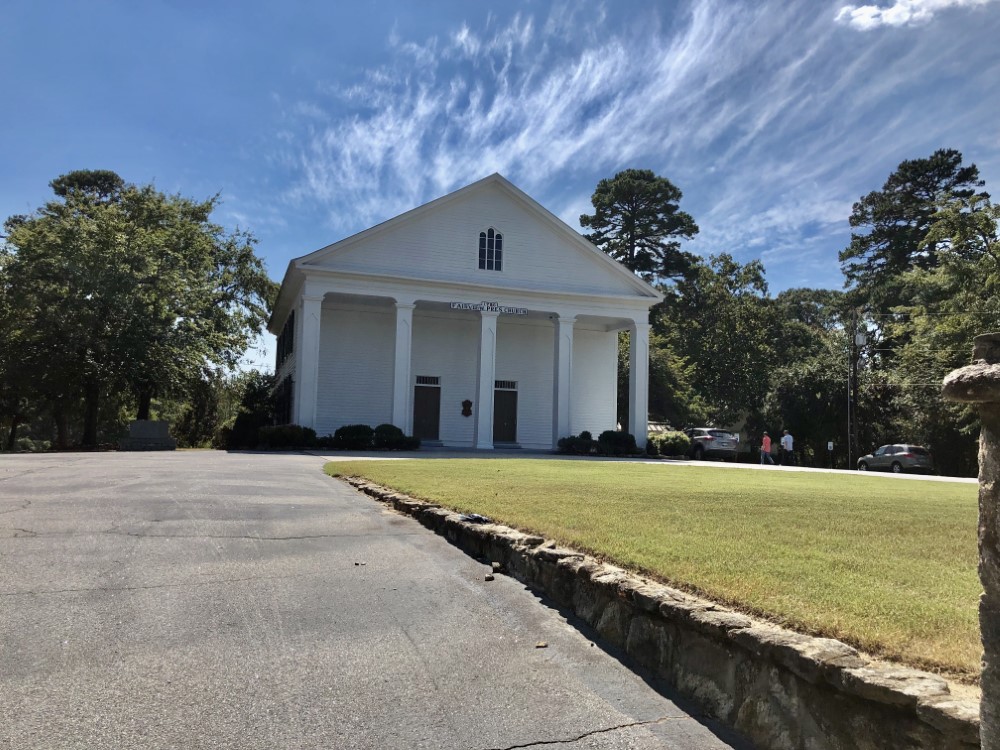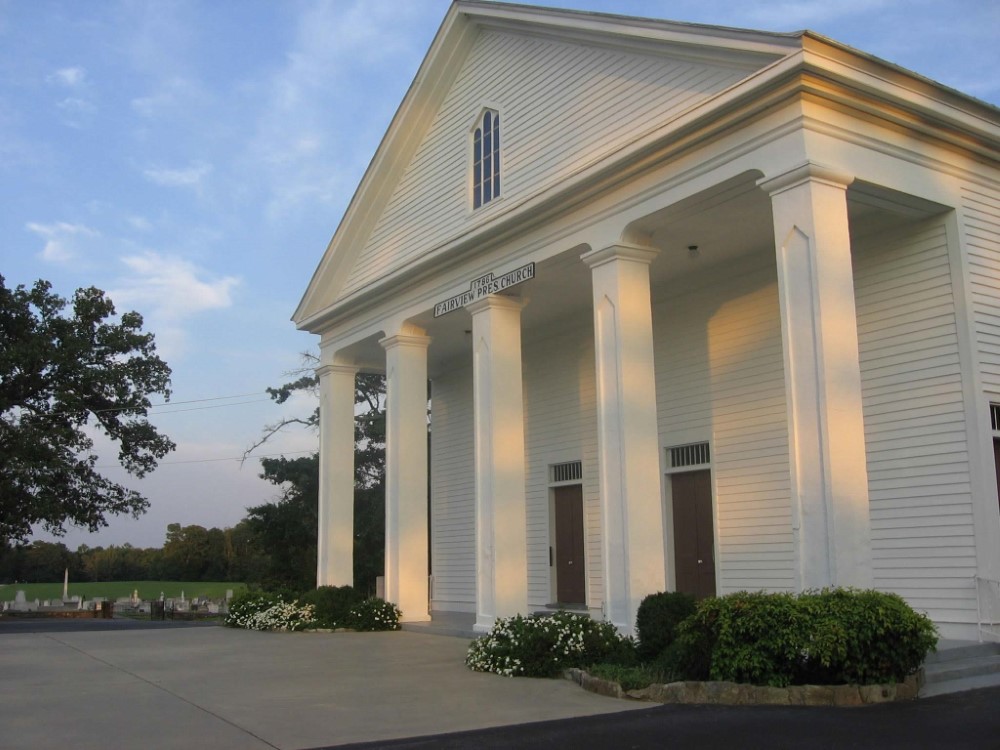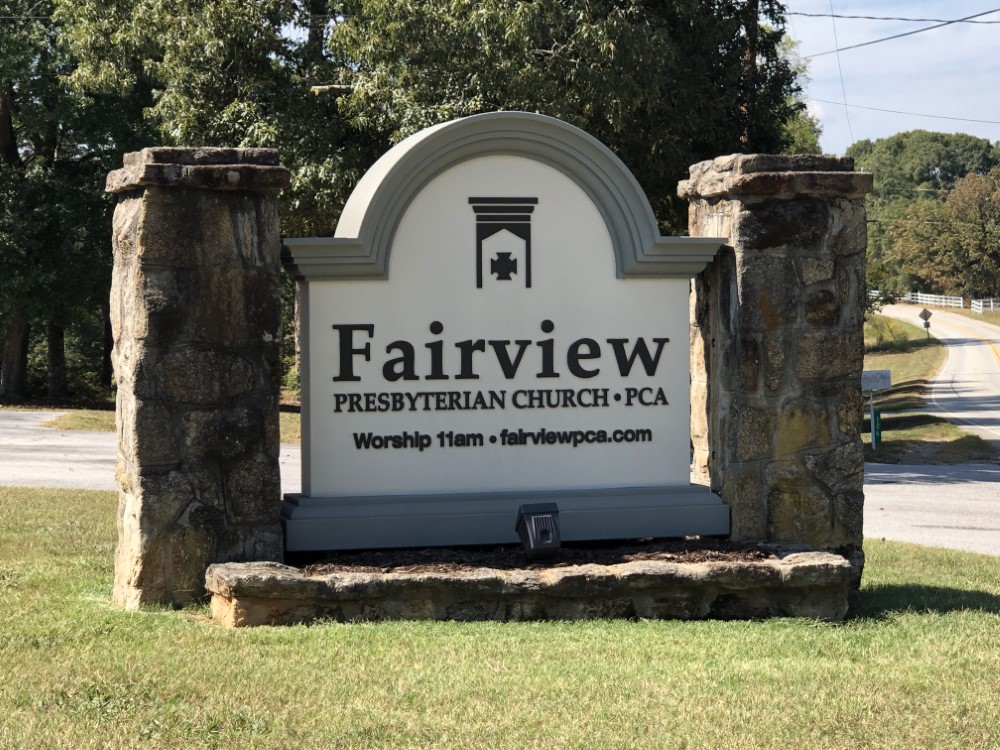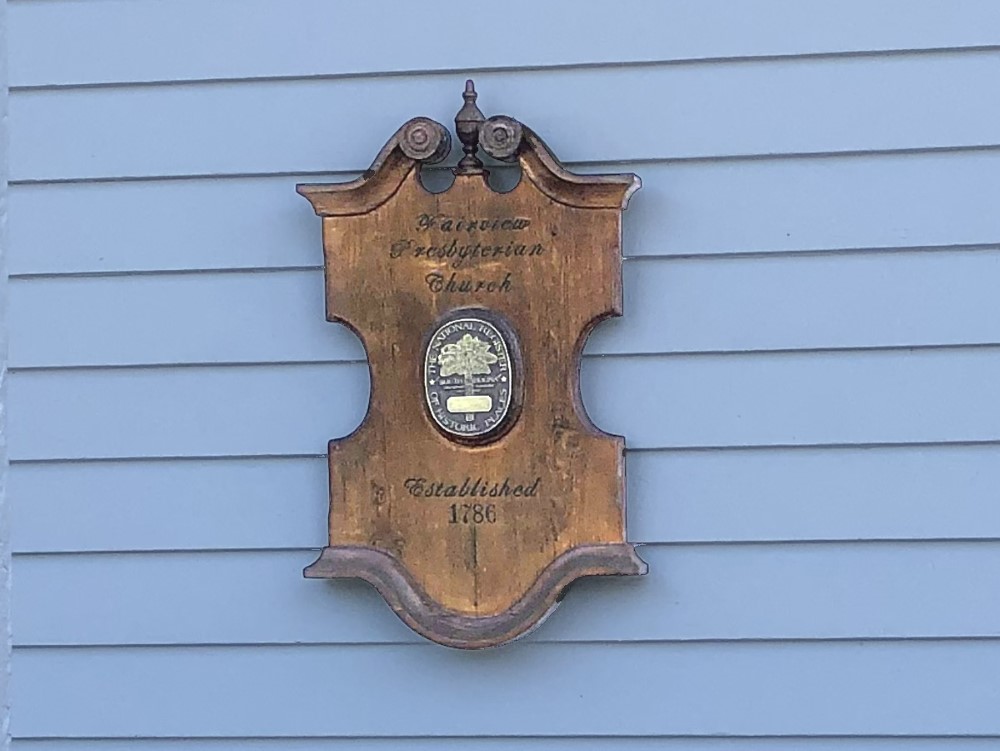A visit to Fairview Presbyterian Church would be well worth anyone’s time and effort for many reasons. Driving down Fairview Church Road, one can’t miss it. Tucked in the countryside of Fountain Inn and built on a slight slope against a backdrop of woods, the church’s striking white exterior beckons the would-be visitor. Indeed, the stirring story of this congregation spans 233 years and is steeped not only in a rich faith tradition but also in the history of our country.
Built in 1858, the current church is considered an original structure. It is a two-story, white, clapboard building with five prominent square columns in the front and a tin roof. Its architectural style has been variously described as “Greek Revival”, “vernacular classic”, and “meeting house.” Such styles were common in the deep south during the mid-19th century. Inside the sanctuary, the pulpit and pews are original furnishings and possess “feather-graining,” making them unique. A gallery or balcony spans each side of the sanctuary. For all these reasons, this building was placed on National Register of Historic Places in 1977. The plaque indicating this can be viewed between the two front entrances on the outside of the building. In 1949, a one-story Sunday School annex was added without disturbing the integrity of the original church building. In 2009, the church dedicated a new Family Life Center on the campus.
The story of this church begins with Scotch-Irish families who immigrated here from County Antrim of Northern Ireland in 1773 to secure religious freedom. John, Samuel, and David Peden, who were brothers, along with their nephew James Alexander and a friend James Nesbit served as soldiers in the Revolutionary War. At the war’s end, the new government could not pay them in cash, but they were deeding land that had been procured from the Cherokee Indians in a treaty. So, these men and their families moved from the Nazareth Presbyterian Church area of Spartanburg to the Fountain Inn area to claim the land. They founded Fairview Presbyterian Church in 1786 and built a simple log cabin for a meeting place. The “Fairview” name was chosen to honor a beloved church in Ireland. Later, a more elaborate log building with a stone chimney on each end, was constructed and served as the second church. In 1818, they erected a new church building out of local, handmade bricks to replace previous structures. After a fire, they recovered some of these homemade bricks, incorporating them into the front pillars of the fourth sanctuary, dedicated in 1858 and currently in use. The famed Bozeman Guard, a Confederate military unit, began its march to Columbia, SC during the Civil War in 1861 at these church grounds. Fairview Presbyterian Church is one of the oldest churches in the Greenville area and the first Presbyterian church to be founded in Greenville County.
Fairview Presbyterian Church adheres to two long-held traditions. The Lord’s Supper is served while members sit on benches at a long table. Offerings are collected by passing a cloth pouch attached to a wooden rod.
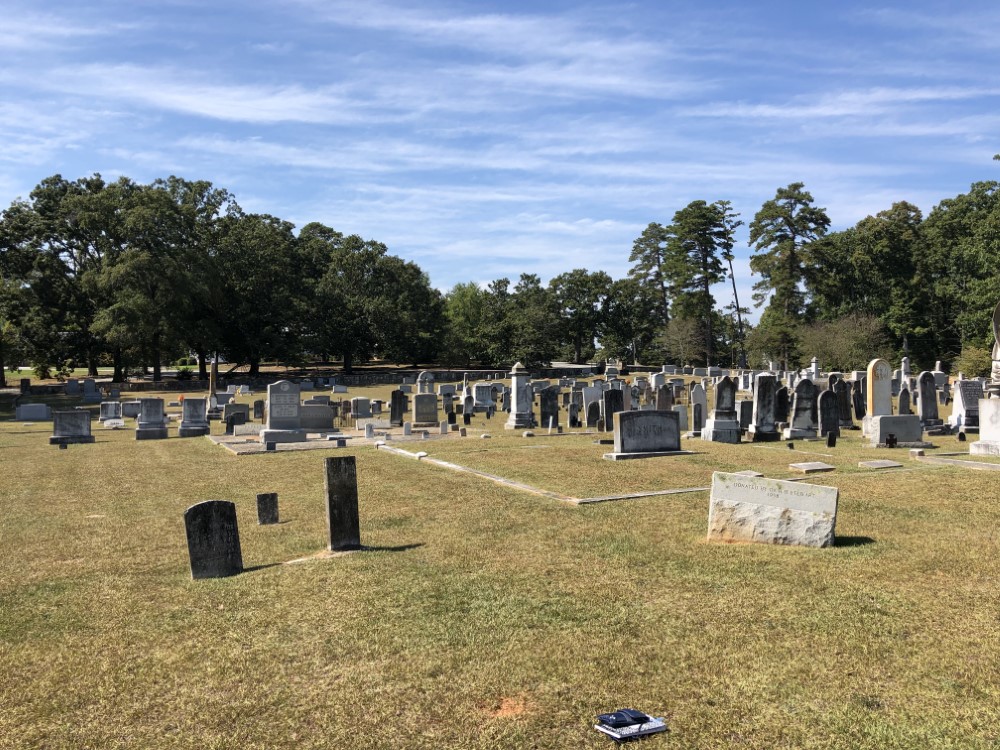
Inside View of Cemetery 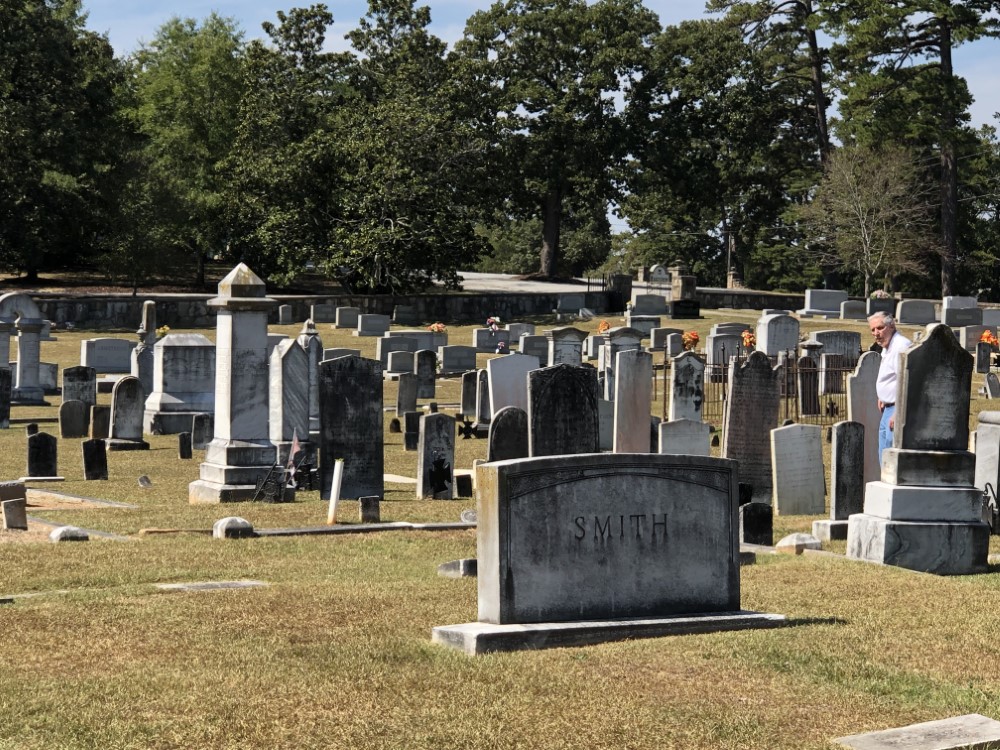
Inside Cemetery 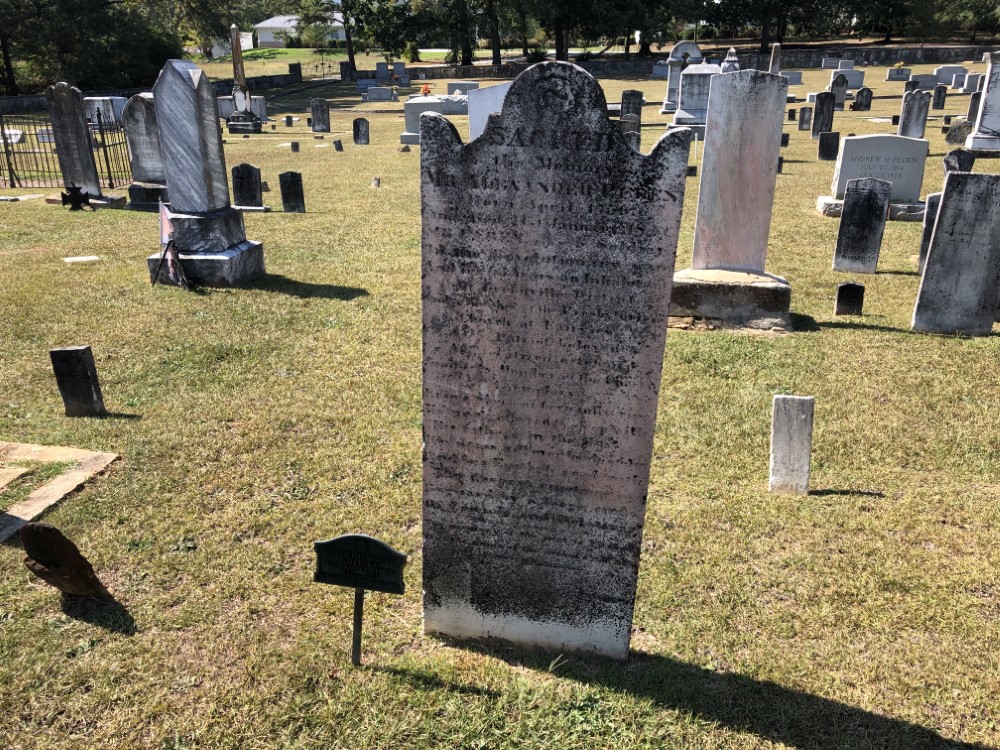
Grave Marker of Alexander Peden – Revolutionary War Veteran 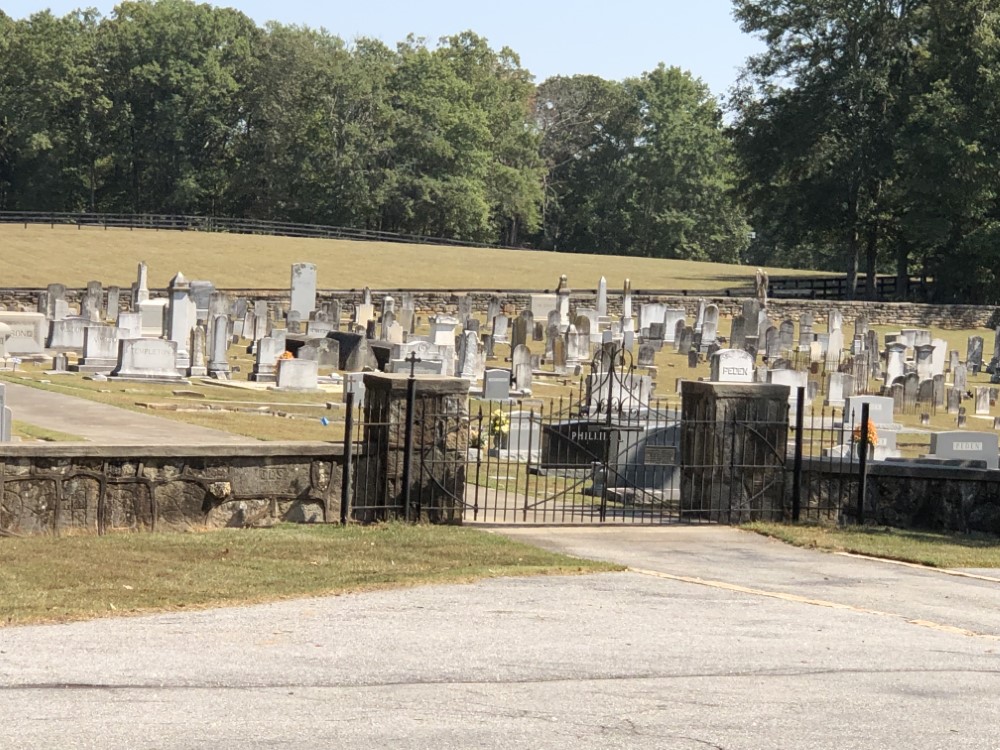
Entrance to Cemetery
An historic cemetery, which has undergone two expansions, can be found on the campus as well. A stone wall, initially built in 1850, encloses the churchyard, while a wrought-iron gate, over one hundred years old, guards its entrance. Within its confines lie the unmarked graves of slaves attending the church before the Emancipation and the graves of veterans who fought in the Revolutionary War (seven), the Civil War (fifty), as well as in other wars. The oldest marked grave is that of a child named Margaret Alexander who died in 1791 at the age of five. Nearby lies another very old grave of 33-year-old Elizabeth Alexander, who passed away in 1797. Interesting monuments include one shaped like a physician bag in honor of family physicians and the Peden family monument bearing the date of 1899. Joe Peden, a current elder in the church, can trace back nine generations to the founders of his beloved church. He tells the story of a grieving father who once planted a magnolia tree between the graves of his two sons killed in the Civil War. The tree has long since disappeared.
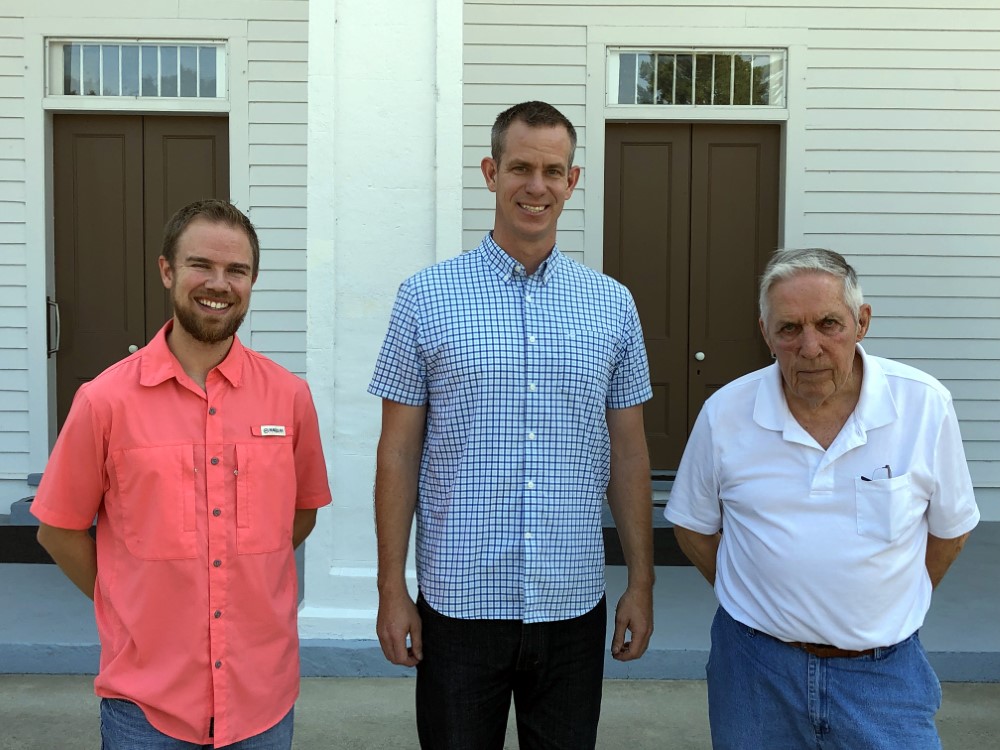
The church’s current pastor, Reverend Jonathan Williams, is relatively new to the position, having arrived in the spring of 2016. A graduate from Reformed Theological Seminary in Charlotte, North Carolina, he also serves as a chaplain in the United States Army Reserve. Jonathan says that he sensed a call into the ministry while a Junior in college. Friends, family, elders in the church, and his desire to serve helped to confirm this calling. To him, a successful church is one where its members experience joy and love in the Lord. He says that when his first daughter was born, he couldn’t stop talking about her because he was so excited. Similarly, when people find that kind of joyful relationship with the Lord, they, too, can’t help but share it. He says, “We are an ordinary means of grace church and not overly programmed. Our fellowship centers around the Word, sacraments, and prayer.” If the scripture is shared and believers are equipped, growth occurs as a natural by-product. The chief end, though, is to help people grow in grace, become more Christ-like, and experience this joy in the Lord.
After a stint in Texas, Kenny Maple returned to this area 2-3 months ago, becoming the most recent staff addition and serving as Pastoral Assistant. Kenny started out as a journalism major at Lander University. During his internship in this field, he began to discern that the Lord was calling him to full-time ministry. His next stop was Erskine Theological Seminary in Due West. Kenny financed his education through writing stories for several newspapers–the Index-Journal in Greenwood, the Greer Citizen, and The Simpsonville Sentinel. His career includes a time as part-time youth pastor where he experienced great spiritual growth and came to know the wonderful Christians here. He says that the church even helped him raise funds so that he could spend some time overseas as a missionary in Bulgaria.
The two men say that their gifts, desires, and inclinations complement and overlap each other. They look forward to working together as they contemplate what might be God’s plan for this great historical church.
Right now, around 120 people regularly attend Fairview Presbyterian Church. The congregation includes a good mix of ages so that meaningful fellowship and learning opportunities can be provided for a wide range of folks. Kenny says that in his 9-year relationship with this church, he has been most struck by the love and the kindness of the people there. “They are a great family of believers that care about one another, showcasing God’s love,” he adds. Jonathan states that a recent visitor relayed this, “I think I have found my home.” He says that folks may be visitors the first time they come, but, thereafter, the congregation embraces them as family.
Both men point to the population explosion occurring in this area. They relay figures indicating that Fountain Inn is the second fastest growing city in South Carolina, experiencing 15.77% growth in 2017-2018. Simpsonville and surrounding areas also show this expansion. They say this congregation must be prepared to reach these people in Christ. Kenny earnestly quotes Romans 10: 14-15 as one of his favorite scriptures. Jonathan says that they want to equip every person in church to do ministry where they are. This church stands poised with dedicated, insightful leadership, intent upon God’s purpose for this congregation in this time and place. One senses that Fairview Presbyterian Church will continue its legacy of faith for generations to come.
Church Address: 126 Fairview Church Road, Fountain Inn, SC 29644.
Church Website: http://www.fairviewpca.com

